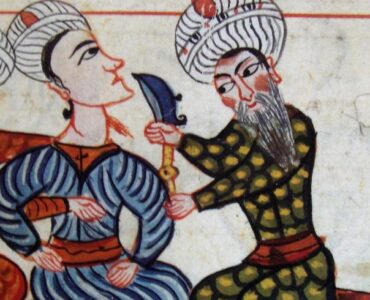
Taxation
Payment of Islamic taxes is considered a religious duty. The most important tax is zakat, which is based on wealth and paid annually. Cash holdings, asset disposals, and inventories are subject to tax at a standard rate of 2.5 percent. Zakat is to be paid by those with surplus liquid wealth for the benefit of the poor and needy, typically via spending on social and humanitarian causes. The collection of zakat is usually organized separately from that of state taxes. Another traditional Islamic tax was the jizyah, or poll tax, paid by non-Muslim residents of a Muslim state to the government in exchange for government protection. The Islamic land tax (kharaj) is applied to both Muslims and non-Muslims according to acreage of land, with the rate depending upon output potential and a maximum rate of half of the crop value.
Taxes In The Islamic Tradition
Taxation in the Islamic legal tradition is a diverse and amorphous subject. Though the borders between their various categories are porous and often meaningless, taxes in the Islamic tradition can be divided into two general categories: Sharīʿa-legitimate taxes that are rooted in the Qurʾān and the practice of the early Muslim community, and those imposed by the ruler by fiat and thus unclear in their Shari’a legitimacy.
In general, the Islamic legal and governance tradition conceived of taxation as calculated on the basis of wealth rather than income. The scriptural basis for the most prominent tax, the zakāt charitable tithe, comes from Qurʾānic verses praising those who recognize that there is a “known right” in their wealth for the poor and that paying this charitable tax “purifies” (the root of the word zakāt) the rest of the person’s wealth. The basis for other types of taxation, such as the ʿushr, also have bases in a number of Prophetic ḥadīths, which provide an outline of Islam’s taxation laws.
In terms of tax base, Islamic jurisprudence recognizes individuals as the taxpaying units. Households, corporations, and other entities are not taxed. Instead, all income and taxable items are ascribed past these institutions to the individual owners and are taxed at that level. Some Muslim schools of law (e.g., Shiʿites and Ḥanifīs) consider minors and insane individuals to be exempt from Islamic taxes, others (e.g., Mālikīs and Shāfiʿīs) believe that in these cases it is the duty of the guardian to pay the tax.
Theoretical ruminations on taxation policy in Islamic civilization are rooted in the Near Eastern traditions of political wisdom and “Mirrors for Princes” literature. In presenting his ideas on taxation, Ibn Khaldūn, emphasized various principles that must be observed to have a sound taxation policy, such as equity and efficiency, justice and neutrality, ability to pay, economy, benefit and convenience principles: “Do not ask for more than is tolerable. Do not charge anyone too much. Treat all the people justly. This makes it easier to gain their friendship and it is more certain to achieve general satisfaction.”
Taxed Goods And Services
Taxes are mainly levied against and calculated based on actual taxable items. That is, these taxes are in-kind taxes. The payment, however, may be either in-kind or in equivalent value. Some of the taxable items are mentioned in Qurʾān or by Muḥammad himself, while others have been added later on. Early caliphs and other rulers altered the tax base innumerable times across the vast geographic extent of Islamic civilization. Some items became subject to tax (such as herbs, honey, horses, amber, minerals, lentils, spice, etc.), while others were at times exempted from it (such as apricots, pomegranates, apples, and similar fruits, oil, mica, etc.). Several items were switched back and forth between taxable and non-taxable categories or their rates were changed. In all cases, taxes should in theory be collected by the state and kept in the public treasury (bayt al-māl), although tax farming began as a practice in the ninth century and proliferated in the Ottoman Empire. For Shari’a-legitimate taxes, they should be collected by the state and then spent on certain categories specified by the Shari’a. Part of the collections must be spent in specific ways and on pre-prescribed items. Taxes not specifically legitimated in Islamic legal discourse, however, enjoyed much more flexibility.
Types Of Taxes
The main categories of taxes that proliferated in Islamic civilization were zakāt, the ʿushr, the kharāj, the jizyah, and the maks. It is essential to note that these categories and terms were often isomorphic and that it is impossible to make consistent, accurate statements about them. This is true even in their pre-Islamic and early Islamic manifestations. Confusion over terms and policies led the ʿAbbāsid caliph Hārūn al-Rashīd (d. 809) to try to find and impose some regularity on the incredibly complex and often contradictory taxation regime that the ʿAbbāsids had inherited from the Umayyad state. This effort can most clearly be seen in the first systematic legal/administrative treatise on taxation, ordered by al-Rashīd, the Kitāb al-Kharāj of Abū Yūsuf, as well as other treaties on taxation produced for the ʿAbbāsid court like that of Qudāmah b. Jaʿfar (d. 948) as well as in independent fiqh treatises like the Kitāb al-Amwāl of Abū ʿUbayd al-Qāsim b. Sallām (d. 839).
- Zakāt: This Qurʾānically mandated charity tax is dealt with extensively elsewhere, but its overlap with other forms of taxation in the time of the early caliphate is noteworthy. Evidence suggests that the second caliph ʿUmar b. al-Khaṭṭāb ordered that Muslims in outlying areas of the rapidly expanding Muslim state who had not already paid the zakāt on their trade goods should be charged the 2.5 percent zakāt rate on precious metals at provincial border posts. Though seemingly not intended as a separate tax, this was soon conflated with the corresponding customs dues levied on non-Muslims (see below) and was thus controversial among Shari’a-minded Muslims of the early Islamic period. The issue of whether taxation should be limited to zakāt obligations has been debated since the time of the Prophet by Muslim scholars.
- Ṣadaqah: Although possibly used to refer to the voluntary charitable giving recommended for Muslims during the Meccan period of the Prophet’s mission and before zakāt was revealed (see Qurʾān 9:79), ṣadaqah is sometimes used interchangeably with zakāt in the Qurʾān to refer to the charitable tithe (see an 2:271). Even in the time of the Prophet, however, it seems likely that ṣadaqah was also understood as a contributive tax asked of tribes that joined the Muslim movement.
- ʿUshr: Although it was conflated even in ḥadīths with the condemnable market or customs tax (maks, see later), the ʿushr (tenth) was primarily understood as a one-tenth tax on agricultural yield. The ʿushr had roots in Near Eastern tradition and was confirmed by well known ḥadīths stating that farmers must pay the ʿushr on crops watered by rain or from springs, while crops irrigated by animals or human effort require payment of only half the ʿushr. Within the reigns of the first three caliphs, however, this tax was conflated with the customs dues extracted from non-Muslim merchants crossing at provincial border posts. This was based on an inference from the Prophet’s saying that “There is no ʿushūr on Muslims, rather it is only on Christians and Jews.” Abū ʿUbayd reports that, beginning with Umar b. al-Khaṭṭāb, the government charged dhimmī merchants five percent customs tax. This was a controversial policy among early Muslim jurists, as reflected in Mālik’s discussion with al-Zuhrī on the origins and legitimacy of the tax, and it seems to have been recognized as a continuity of pre-Islamic customs. The ʿushr as a customs duty was recognized by the ʿulamāʾ as legitimate, with most Sunnī schools of law recommending that it be taken from merchants coming from outside the Abode of Islam regardless of their home countries’ policies. The Ḥanafī school, Zaydī Shiʿites, and some Shāfiʿī scholars, however, only advocated taxing foreign merchants if their realms take the same tax from Muslim merchants.
By the twelfth century, ʿushr was the name used to refer to the tax levied on trade goods carried by Muslims and non-Muslims alike. Its levying was diverse. Muslim merchants in Mamlūk Egypt and Syria paid the 2.5 percent zakāt rate noted above. Non-Muslims paid a higher rate, which could rise up to an exploitative thirty-five percent of the goods’ value at times. The ʿushr tax was levied in northern India under the Delhi Sultanate in the 13thcentury, but it lapsed at some point, until it was revived by the Mughal emperor Aurangzeb, who once again imposed the 2.5 percent internal customs tax on Muslim merchants and five percent on non-Muslims.
- Maks: Often overlapping with the ʿushr, the maks, the toll or customs tax, probably originated in the ten percent pre-Islamic market dues charged for foreign merchants in the Hijaz. The term has retained an unsavory and illicit air in Islamic legal discourse and has often been used to denote illegitimate and exploitative taxes, hence the Prophet’s saying “The levier of the maks will not enter Paradise” (Sunan of Abū Dāwūd). Its reintegration into early Islamic practice may have come with the second caliph ʿUmar’s decision to charge merchants from outside the Abode of Islam a ten percent customs levy just as they charged Muslim merchants in their lands.
Egypt provides a useful case for the tax’s progression. Originating as a one-tenth customs duty levied on merchants, during the Fāṭimid period it mushroomed to include unpopular duties on a vast range of goods and foodstuffs (see Björkman, “Maks”). Although it was conflated with zakāt at the time, in the twelfth century the traveler Ibn al-Jubayr recounts the painful inspections performed on the property of passengers arriving in Alexandria to extract customs taxes from them. Maks taxes became even more exploitative and deeply unpopular in the later Mamlūk period. Yet Egyptian taxation seems to have paled compared to the customs duties levied on those entering the lands of the Delhi Sultanate in the mid-1300s, when Ibn Baṭṭūṭah reported that one quarter of all goods were taken as tax. Two years later, however, after receiving recognition from the ʿAbbāsid caliph in Cairo, the Delhi sultan reduced this rate dramatically after learning that only the ʿushr and zakāt were Islamically permissible.
In Islamic legal discourse, maks is often understood as a catchall term for Shari’a-illegitimate taxes. More technically, it is defined as any tax that unjustly changes the price of a good. As a result, modern VAT, sales, and excise taxes as well as customs taxes would fall under this category. Some modern Muslim jurists, however, like the former Mufti of Egypt Ali Gomaa, have that maks should more properly be understood as taxes levied unjustly or exploitatively by a government. This unjust collection of taxes could be widened to include any tax that is collected and redistributed unjustly.
- Kharāj: Unlike zakāt, the Islamic land tax (kharāj) is applied to both Muslims and non-Muslims. Originally, the kharāj was only supposed to be collected from lands conquered by force (ʿunwatan) as opposed to those that surrendered to Muslim rule by agreement (ṣulḥan). But eventually it was levied on almost all land. In part, this was due to its eventual conflation with the ʿushr tax, and the rules for the two species of tax became intermingled. In general, the kharāj was levied according to the privately owned acreage of the land, but the rate depended on the land’s output potential. Higher rates applied on irrigated lands, better soils, and fields suitable for higher-value crops. The legal foundation for this rate comes from the caliph ʿUmar’s institution of the kharāj in southern Iraq, which was based on the Sassanid taxation values for different crops. The maximum rate was half the value of the crop. In the event of crop failure owing to climatic factors, the tax is not to be applied. If low yields are the result of negligence, then the owner will still be obliged to pay. In such circumstances the land may be sold to another farmer, who, it is hoped, will make better use of it. If the land in question was the property of the ruler or bayt al-māl but was worked by farmers, the revenue from was called kirāʾ al-arḍ, (land rent).
- Fayʾ: This was originally understood as the spoils of battle (ghanīmah) won by the conquering Muslim army (Qurʾān 59:6–7), especially spoils acquired without engaging in battle (spoils taken during or after the battle the term were better known as khums) and including mineral and other hidden wealth. The fayʾ soon transformed into the notion of taxes levied from conquered peoples. From the mid-eighth century, fayʾ was understood as tax revenue from land (kharāj) and not the spoils of conquest.
- Sundry Taxes: In addition to the named taxes discussed so far, pre-modern Muslim states also levied other desultory taxes at various times. The Fāṭimids levied what Ibn al-Jubayr described as an oppressive toll, amounting to 7.5 gold dinars per person, on pilgrims passing through Egypt on their way to Mecca. The traveler lavished praise on Saladin for abolishing it. The Ottoman state occasionally levied a special tax called ʿawāriḍdīwāniyya to fund military campaigns, provision the imperial palace, and maintain other infrastructure in the empire. As the military expenses of the state increased in the late sixteenth century and New World precious metals devalued Ottoman coin, the ʿawāriḍ became permanent annual taxes.
Tax Farming And Land Grants
One of the most important developments in tax regimes in Islamic civilization was the emergence of land grants and tax farming. Pressed for liquid wealth to pay its armies, the ʿAbbāsid caliphs of the ninth century began offering payment in the form of the iqṭāʿ, or a direct grant of the tax revenue from a set area of land. Later, when the caliphs became figureheads for local strongmen in the tenth century, they themselves received iqṭāʿs from their protectors. In Iran and Iraq, the ʿAbbāsids also sold rights to tax farm (muqāṭaʿah) in return for a lump sum. Eventually a breakdown of central authority in Iran led the muqāṭaʿah and iqtāʿ to meld into one another. Under the Seljuqs, iqṭāʿ grants became even more common and eventually hereditary.
In the Ottoman Empire, land taxes were a major source of state revenue, with the early Ottoman conquest state assuming ownership and control of vast tracts of land. In the 1500s the Ottoman government began auctioning off tax farming rights to private bidders. Termed the muqāṭaʿah system, successful bidders were given the right to collect taxes from the land for a three-year period in return for a lump sum payment. This system was extended to mining, the minting of coinage, and even the collection of customs revenue. By the mid-eighteenth century, however, the ability of the Ottoman government to keep up land tax registries and collect the revenue waned, and it preferred issuing long-term leases (iltizām) with tax farming privileges to landlords, usually members of the local elite. This could be highly oppressive for the peasant population. In Ottoman Egypt, peasant farmers often paid two thirds of their annual yield to the landlord/tax farmer, who then sold it in Cairo. Through the mid 1700s, the Ottoman state had relied on a body of Turkic cavalry who were paid in land grants called timars, which allowed the soldier to collect a tax called the ʿushr of between 1/8 and 1/3 of the agricultural yield. Challenges in maintaining this system led to a shift in which the timar grants were converted into large landholdings for the local elites (ayan), who were then expected to bring a suitable contingent of cavalry to the army muster.
Tax Regimes In The Modern Muslim World
In the nineteenth century, taxation was central to both the direct experience of European colonization and the reform programs initiated by states like the Ottoman Empire and Qajar Iran. Programs like the Ottoman Tanzimat were built on an understanding that modern, centralized states with effective militaries depended on regular tax yields and had to develop bureaucracies that could accomplish their collection. More and more secular taxes were introduced and income tax was introduced in many parts of the Islamic world, although this never proved popular, and in practice often only government employees paid the tax. In countries such as Iran, tax evasion was widespread under the secular regimes of the shahs, although the zakāt was administered independently by the mullahs through the mosques. There were frequent attempts at government interference, but these were resisted by the clerics, who had little faith in state social-welfare provision.
Recent years have witnessed a resurgence of interest in Islamic taxation, particularly in states eager to shore up their Islamist credentials. Though zakāt payment had long been a private affair, Saudi Arabia (where zakāt is one of the few forms of taxes levied at all by the government), Sudan, Pakistan, and Iran all now require zakāt to be paid by law or deducted from financial institutions automatically. In many other countries with Muslim majorities, there has been a push to collect and streamline the collection of zakāt through the creation of private community treasuries usually in the form of trusts.
Summary
Islamic governments traditionally imposed various taxes on Muslims, who considered their payment to be a religious duty. The most important of these taxes was zakat, a tax based on wealth. Intended to benefit the poor and needy, the funds collected for zakat were allocated for social and humanitarian causes. With the arrival of European rule, the Islamic system of taxation was largely abandoned. In recent years, however, some Muslim countries have restored its use.
A System Of Redistribution
Zakat, setting aside a portion of one’s wealth for the poor, is one of the five Pillars of Islam. All Muslims who can do so must give 2.5 percent of their net worth annually. Forms of wealth that may be subject to zakat include gold, silver, livestock, crops, currency, and other items that can be converted to cash, such as stocks and bonds.
Verses from the Qur’an revealed to Muhammad during his early years in Mecca underscored the importance of caring for the needy. The hadith formalized zakat as a religious duty for believers. Islamic officials started collecting and distributing zakat during the 600s. Muslim leaders took this responsibility seriously. Abu Bakr, the first caliph, went to war against tribes that refused to pay zakat. Governors and appointed officials assisted the caliph in collecting the tax from distant provinces.
The payment of zakat is based on the Islamic belief that everything belongs to God, and human beings are merely caretakers of God’s property. The word zakat is derived from an Arabic word associated with both growth and purification. Muslims believe that redistributing money from the rich to the poor causes community wealth to grow. Islam also teaches that zakat brings blessing to those paying the tax. Giving away wealth purifies the heart, enabling the individual to resist the love of wealth, which leads to sin.
Profits And Produce
Very early in the history of the Islamic community, Muslims were required to give one-fifth of the plunder from warfare to the Prophet Muhammad. The khums (fifth) tax, as it was known, benefited Muhammad’s family and certain groups of needy people in the community. After the Prophet’s death, khums was applied to various types of profit. The tax was particularly important to Shi’is, who maintained the right of the Prophet’s descendants to continue to receive financial support. After the disappearance of the twelfth imam in the late 800s and the end of the line of visible imams, most Shi’is abandoned the practice of paying khums. During the 1200s, the Usuli school of jurisprudence revived the tax and outlined new regulations for its distribution. One portion supported the needy among the Prophet’s descendants and the other portion went to the mujtahids, members of the Shi’i clergy. The practice of khums gave the Shi’i clergy in Iran a source of income that contributed to their independence from state control.
Historically, Muslim governments collected a tax on the produce of agricultural land. Known as ushr, meaning “tithe” or “tenth,” the tax applied primarily to cereals and fruits. Governments collected one-tenth of farm produce grown using rainwater or natural springs and one-twentieth of the output if the landowner used irrigation or any other artificial means to raise the crops.
Renewed Interest
During the 1800s, European powers established political control over much of the Islamic world. Colonial governments introduced income taxes. Most Muslims evaded these payments, which generally undermined traditional Islamic methods of tax collection. As a result of the institution of secular tax systems, zakat became a voluntary process.
In recent years, governments in some Muslim states — such as Jordan, Saudi Arabia, Pakistan, Libya, and Sudan — have taken steps to restore Islamic taxation. In Saudi Arabia, for example, zakat is the main form of taxation, and although contributions are voluntary, most Muslims willingly pay.
The nature and range of economic activity has changed significantly since the time of the Prophet. These developments have generated much debate among Islamic economists and lawyers regarding the types of assets that are subject to zakat. The type of tax structure that was appropriate for agricultural economies with only simple trading businesses clearly differs from one that is suitable for industrialized economies with businesses organized on a corporate basis. Islamic scholars have only recently begun to address these issues. See also Economics; Justice; Pillars of Islam.
Paying Islamic Taxes In Cyberspace
Some new players in the business world have taken on the task of aligning the Qur’an with the world of modern finance. In 2000 a company called IslamiQ.com began to offer various online investing services, including the payment of zakat to charitable organizations. A board of experienced Islamic scholars headed by Muhammad Taqi Osmani, a justice of Pakistan’s Supreme Court, ensures that the company’s activities correspond with Islamic principles. IslamiQ.com initially planned to offer its services in the United Kingdom and Asia but hopes to expand to the Middle East and the Americas.
Taxation
410 – 008–
https://discerning-Islam.org
Last Update: 02/2021




